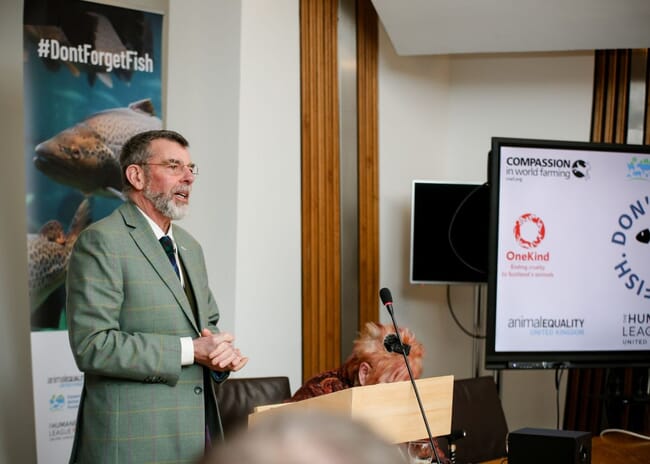
© Lindsey Cleland, Edinburgh Photographic
Whereas farmed land animals are protected by laws which detail how each species should be killed in a minimally painful manner, with those who break these laws becoming liable for prosecution, farmed fish have no equivalent protections.
This is despite consensus among scientists that fish can think and feel, including feel pain. An estimated 77 million fish are farmed and slaughtered in the UK annually, with the majority of these being Atlantic salmon farmed in Scotland. This makes fish the second largest group of farmed animals in the UK, after chickens.
The parliamentary reception, sponsored by Christine Grahame MSP, heard from organisations working to address this legal disparity in line with the Animal Welfare Committee’s updated Opinion and also discussed the necessity for official guidance to support the industry to meet its legal obligations at every stage of farming and to enforce the law against those who break it.
Ronnie Soutar, head of veterinary services at Scottish Sea Farms, said there was clear recognition within the sector that fish are sentient, and that legislation to protect their welfare at slaughter would be welcomed by the aquaculture industry.
The reception was jointly organised by The Humane League UK, Animal Equality UK and The Animal Law Foundation and supported by Compassion in World Farming, The Conservative Animal Welfare Foundation, OneKind, Animal Concern, and Labour Animal Welfare Society.
Although most salmon farms in Scotland have signed up to voluntary accreditation schemes which include mandatory stunning prior to slaughter, private schemes have limited enforcement powers, and charities argue they should not be solely responsible for safeguarding animal welfare.
Sean Gifford, managing director of The Humane League UK, said: “It has been fantastic to get decision-makers round the table in Scotland, the heart of UK fish farming, and discuss the serious threats facing the welfare of farmed fish. Talk is good but action is what is needed, as Government committees have highlighted for decades the need to take fish welfare seriously. Fish can think and feel; and as fish farming continues to grow, failing to protect these sensitive animals becomes ever more unjustifiable.”
Edie Bowles, from The Animal Law Foundation, added: “ We are honoured to be given the opportunity to meet with some key stakeholders involved in salmon farming in Scotland and to see the support the event has had with decision makers in Holyrood. Fish have some legal protections, but what is now being accepted is the lack of application of these protections in practice, this follows a recommendation from the Rural Affairs and Islands Committee that official guidance is needed to provide an explanation on what the legal protections mean to help the industry understand their obligations and where there are breaches of those obligations, it will assist enforcement bodies from bringing enforcement action.”



